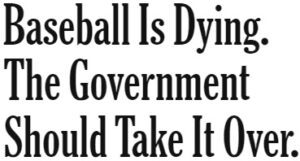by Dan Mitchell

You can actually learn a lot about sensible tax policy by looking at the behavior of professional athletes and sports franchises.
Simply stated, people respond to incentives.
That’s true in the United States. And it’s true overseas.
We can also learn about the pitfalls of cronyism by looking at sports.
And maybe we can also learn why socialism is a mistake.
Not just watered-down tax-and-spend socialism-lite. In this case, we’re talking unvarnished government-ownership-of-the-means-of-production socialism.
At least sort of. Matthew Walther wrote a satirical column (or was it semi-satirical?) for the New York Times about how politicians should take over baseball to save it.

It pays to be honest up front about what nationalizing baseball would entail. While I like to think the Biden administration could seize all 30 teams and dissolve the league by executive order, citing language buried somewhere in the text of the Patriot Act, it’s more realistic to assume that Congress should be involved. . The legislation would allow teams to be purchased at their current (and absurdly inflated) market value.Players, coaches and other staff would become federal employees. The general manager would be appointed by the governor of the state in which the team plays its home games; manager would be a statewide office that citizens vote for every six years. There would be no term limit. …Revenues, though reduced, would be more equitably distributed. I imagine gate receipts and merchandise sales are being given en bloc to local authorities in cities where teams play, bolstering the coffers of many struggling municipalities. Public funding of stadiums would continue, but instead of being a cynical grab of money by destitute owners, it would be a noble enterprise, accepted by indifferent citizens as one of those worthwhile cultural enterprises like the Smithsonian Institution that governments are obliged to support.
The lesson the rest of us should take from this column is that baseball may be declining in popularity…and a government takeover would be the surest way of completely killing the sport.
Matt Welch of Reason understands. He responded to Walther’s column with a serious point about the baleful impact of government-subsidized stadiums.

…both the essay and the spectacle of an ambivalent Opening Day are timely reminders that much of what plagues the sport is not solvable by government, it emanates from government. …Giving out subsidies and tax breaks for sports business owners is self-evidently terrible enough, as have concluded virtually every non-corrupted economist who has ever studied the issue. …Self-funders are also incentivized to stay put, rather than jilting the local fan base. “When governments become landlords,” I wrote last year, “sports businesses, no matter how deep their pockets, start acting like tenants: always eyeing the exits for a potentially better deal. If you build it, they will leave.” Baseball doesn’t need to be nationalized, it needs to be privatized—no more subsidies, no more finger-wagging congressional hearings, no more State of the Union address moralizing, no more unique-to-this-one-sport carve outs from federal law. It’s time for these welfare queens to pull themselves up by the bootstraps, and compete for audience share as if their bottom lines depended on that as much as it does on the ribbon-cutting innumeracy of dull-witted politicians.
Amen.
P.S. Back in 2012, I waxed poetic in a TV interview about politicians investigating steroid use.
P.P.S. I also opined that year about Olympic athletes being taxed by the IRS.
P.P.P.S. In 2016, Cam Newton of the Carolina Panthers learned a very painful lesson about marginal tax rates.
Daniel J. Mitchell is a public policy economist in Washington. He’s been a Senior Fellow at the Cato Institute, a Senior Fellow at the Heritage Foundation, an economist for Senator Bob Packwood and the Senate Finance Committee, and a Director of Tax and Budget Policy at Citizens for a Sound Economy. His articles can be found in such publications as the Wall Street Journal, New York Times, Investor’s Business Daily, and Washington Times. Mitchell holds bachelor’s and master’s degrees in economics from the University of Georgia and a Ph.D. in economics from George Mason University. Original article can be viewed here.
Self-Reliance Central publishes a variety of perspectives. Nothing written here is to be construed as representing the views of SRC.
